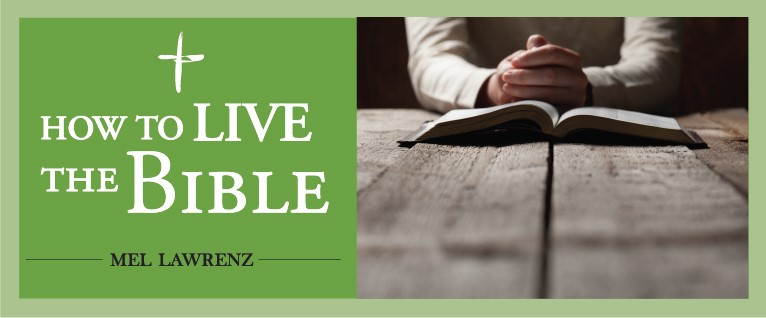
This is the one-hundred-third lesson in author and pastor Mel Lawrenz’ How to Live the Bible series. If you know someone or a group who would like to follow along on this journey through Scripture, they can get more info and sign up to receive these essays via email here.
Mel Lawrenz will be offering daily online ministry during this health crisis. Sign up here.
For a season, “How to Live the Bible” will focus on biblical truths that bear on the global health crisis that has so profoundly affected our lives in these days. Mel Lawrenz is teaching pastor at Elmbrook Church and the author of numerous books including Spiritual Leadership Today.
What do you do when life is suddenly terribly disrupted? When you have to change your pattern of life? When your relationships become disjointed?
This is where we live now. The global pandemic has imposed this on us. We now have fears about an illness that could be fatal for many people. Large numbers of people have suddenly become unemployed. Friends are limited in the contact they can have with each other. In some parts of the world with limited medical infrastructure, large numbers of people are wondering how they will get through this period.

This time in which we live will require a new level of faith.
This is not the first time people of faith have had to trust in God in greater measure because some dramatic force has disrupted their lives. In fact, this is a story told many times over in the Bible. One such time was when the people of God suffered the destruction of the core of their nation. When the Assyrian Empire and then later the Babylonian Empire descended on Israel and Judah and scattered their inhabitants and took many into exile.
God’s people needed to know how to cope. How to survive. Maybe even how to thrive.
It is possible. In the Old Testament we have the stories of how God’s people coped with disruption and exile. And in the New Testament the story continued. Yes, the Jews were able to return and rebuild Jerusalem and a semblance of what used to be their nation. But then they were conquered and dominated by the Greek Empire, and then by the Roman Empire.
Plan B became Plan C. And then Plan D.
Many of us have experienced the same. We thought our lives would progress along a certain trajectory. But then someone got sick. Or someone lost their job. Or someone got divorced. Or someone died. Or a virus swept across the world like a swarm of locusts.
This is where we live now. Our minds are reeling with how fast it all happened. We hear different opinions from different authorities. We are left wondering what will actually happen. We live in a moment when we need a faith that is deep, not shallow. Real, not wishful thinking. Informed, not opinionated.
Is there something we can learn from the experience of exile in Scripture?
First, we lament. Part of dealing with the extreme disruptions we are experiencing during this global health crisis is to honestly admit to ourselves and to God and to others just how it all upsets us. That’s the power of lament.
There are reasons for the psalms of lament in the Old Testament. To be honest about the hard feelings we go through when life has become disrupted does not work against faith. It is integral to faith. When we lament, we are reacting honestly to reality. We are facing the problems head-on. And then we can dig deep for that faith that will help us carry on. Then we will come up with really smart solutions to our dilemmas.
This is expressed so well in Psalm 137, written from exile.
By the rivers of Babylon we sat and wept
when we remembered Zion.
There on the poplars
we hung our harps,
for there our captors asked us for songs. (vv. 1-3a)
I first engaged with this passage of Scripture a long time ago through a song that used these words in a mournful, haunting melody. It stuck deeply in my heart.
Psalm 137 was written by someone among the exiles who had been ripped out of Judah and carried hundreds of miles away into Babylonia. This person is thinking about Zion (Jerusalem) before that fateful day in 587 BC when the armies of Nebuchadnezzar of Babylon breached the walls of the besieged city and destroyed it, and the temple within it.
Unthinkable.
But, a new reality imposed itself. Life in exile. The people of God were forced to look at life and God in a new way.
We can do this today. Being socially confined and being at home is a far cry from having your home burned to the ground.
Living in exile begins with acknowledging the new reality. As the people of God exiled to Babylon realized, God is there. In the exile. Nothing is going to change that.
___________
Get Mel Lawrenz’s daily thoughts and prayers during this health crisis by signing up here.
___________
[If you believe this series will be helpful, this is the perfect time to forward this to a friend, a group, or a congregation, and tell them they too may sign up for the weekly emails here]
Mel Lawrenz (@MelLawrenz) trains an international network of Christian leaders, ministry pioneers, and thought-leaders. He served as senior pastor of Elmbrook Church in Brookfield, Wisconsin, for ten years and now serves as Elmbrook’s teaching pastor. He has a PhD in the history of Christian thought and is on the adjunct faculty of Trinity International University. Mel is the author of 18 books, including How to Understand the Bible—A Simple Guide and Spiritual Influence: the Hidden Power Behind Leadership (Zondervan, 2012). See more of Mel’s writing at WordWay.
The post How to Live the Bible — Living in the Exile of Pandemic appeared first on Bible Gateway Blog.










